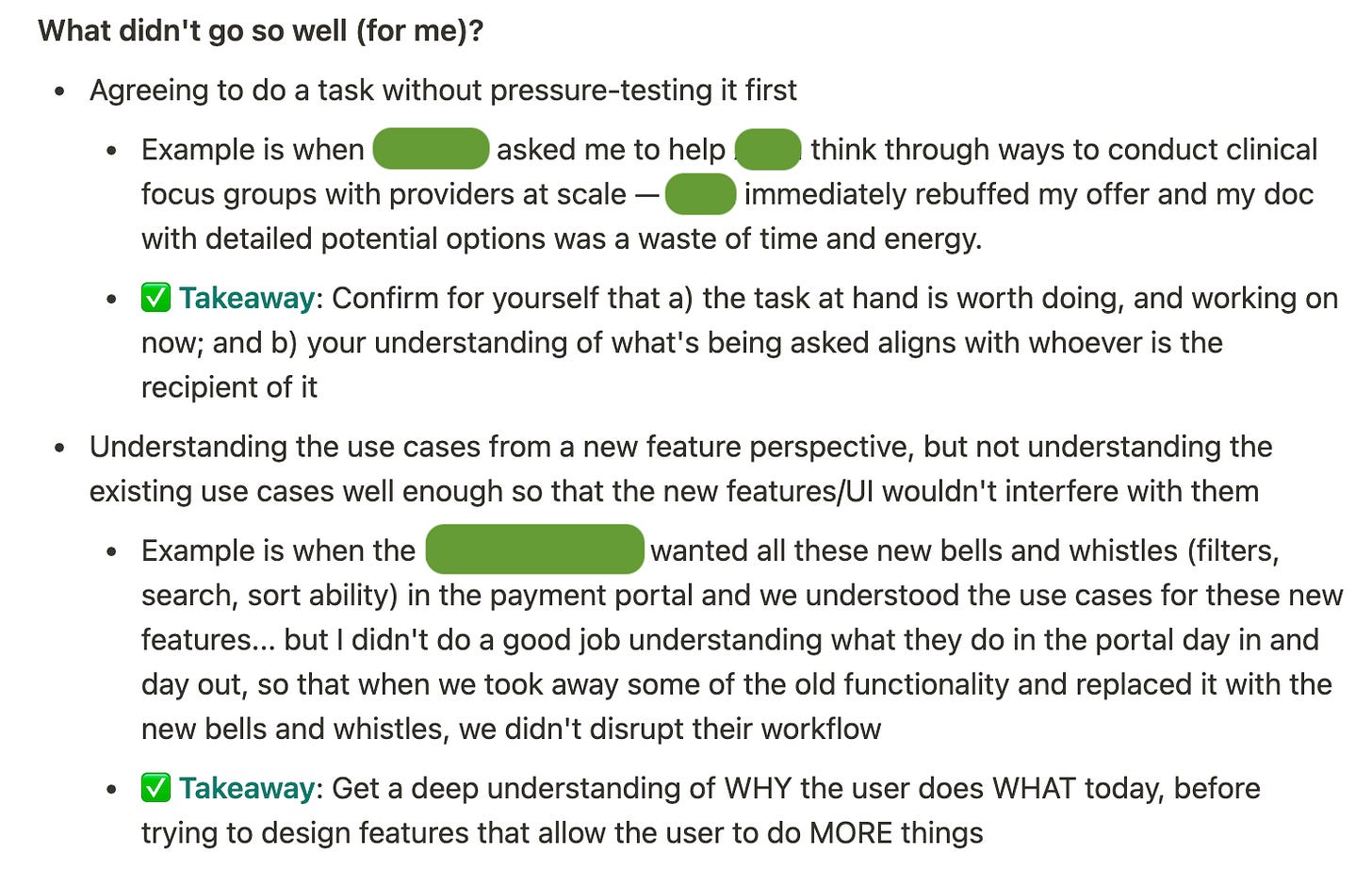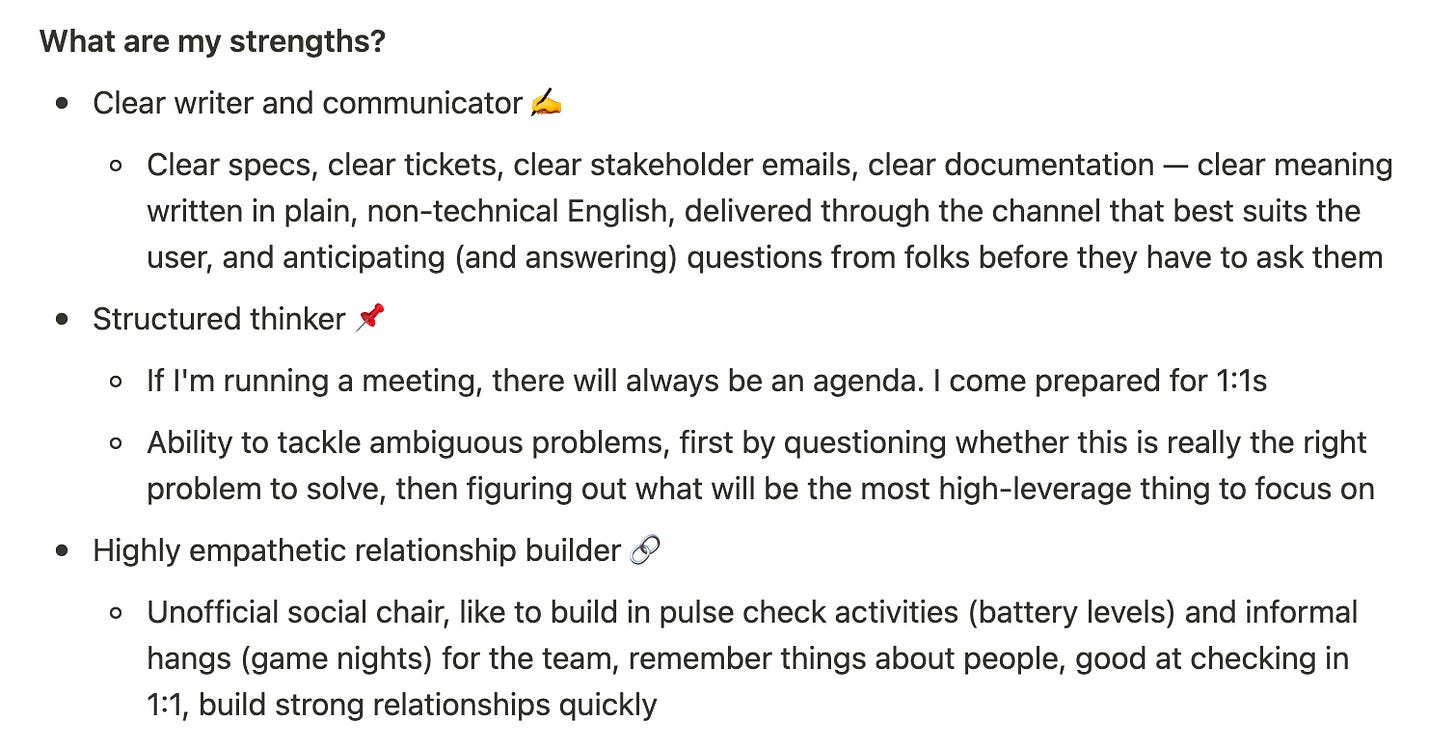How to make friends and build street cred in your first 30 days
An onboarding plan template + tips for starting a new role on the right foot
Hello from the other side! Long time no see, my friends. I started a new job at the beginning of May and have thrown myself headfirst into onboarding. Now that it’s been almost six months (!) I wanted to dust off ye ole Substack and share some advice on how to hit the ground running—Naruto-style, of course—in a new role. Keep in mind that this is from my perspective coming into a PM role, and that your onboarding experience should be tailored to your specific context, but most of what I have to share should be broadly applicable. Shall we?

Before you start your new job
Alright. This is our first stop. I really can’t over-emphasize how important rest + reflection is for setting yourself up for success. You don’t want to show up to your new role feeling burnt out and crusty—you want to pull up as the best version of yourself. You also want to feel present: even if you’re like me and switching from one remote role to another, you don’t want to feel like you’ve shipped your old laptop back and started booting up your new one in the same breath (we love a remote job).
Take a meaningful break in-between jobs. Seriously. Add a week, preferably two, to however long you think would be the bare minimum for you to show up refreshed and totally focused. My last day at my previous job was on a Tuesday, and I started my new job the following Monday. I was eager to start, mainly because I was pumped about the new job and wanted to dig in, but in hindsight it would have benefited me to take a little bit more time. If I were to do it again, I’d try to take two or three weeks. Remember that you’re a person with a life and interests and goals outside of work: use this time to rest—and get out of the mindset that you need to earn your rest; you are entitled to your rest, honey!—and to re-invest in whatever fills up your cup: catching up with friends and family, running the errands that you’ve been putting off for months like cleaning out your closet, etc. The most important thing here, however, is to try to completely disconnect from your professional identity in preparation for fully re-immersing yourself in just a few weeks. So unless it really, really brings you joy, I’d steer clear of reading a bunch of, say, reading 100 books on product management or learning how to write SQL queries. Come on, people. Do your worst.
Reflect on your last job. In my last week at my previous job, I started a simple doc with:
Reflections at the company-level: See my example below—I mused on whether or not I’d want to work in the same type of company and space again, as well as my evolved thoughts on leadership: what it looks like on paper, and what it feels like in practice, and what I wish I’d known before joining. This isn’t meant to be a roast, but rather a personal reflection on what worked and didn’t work for you at the org or industry-level.
What didn’t go so well for me? This one is an exercise in a little bit of tough love for yourself. Push yourself to be brutally honest with yourself—what were some of the biggest points of constructive feedback you received from your manager and peers? Where did you feel like you evolved the most since you started that role? Again, here are mine:
What are my strengths? This one’s self-explanatory, but I think writing an honest assessment of your strongest skills is something well worth revisiting when you’ve started your new role to think through where you can immediately add value with disproportionate ease. A good prompt for thinking through this question is “What comes much more easily to you than it does to other people?”
Lastly, what are some rituals or practices that worked well at this team or company that I’d want to bring to my next role? Examples here for me included social events for my team, informal peer feedback requests, and writing down personal details about people (their dog’s name, where they’re from, what hobbies they have).
Write down your outsider and skeptic POV on the company you’re about to join. I think this is particularly salient for someone who’s joining a Product role, and especially at a B2C company. The moment you actually begin your employment at a company, you are no longer your company’s average user. You know way more than they ever would. So write down your impressions of what worked well, what’s felt unintuitive to you in the product (e.g., what functionality you would have expected in x part of the product but actually lives under the y tab; ease using the app in x use case but difficulty using it for y use case, etc.) and what your product wishlist might be.
Don’t give into imposter syndrome. What I mean by this is, don’t put yourself down for not having had the exact experience that this new role requires. Instead, use your imposter syndrome to your advantage. This is especially powerful in product roles: hold on to the feeling of not knowing everything, because it preserves your curiosity and helps you identify and test assumptions—really critical PM skills.
The first 30 days
Your goal here is to establish relationships and be a sponge. I actually wrote down a rule for myself on a sticky note attached to my monitor: Don’t offer unsolicited advice in the first two weeks. Just listen! The time to act will come—in fact, there will be pressure to act sooner than you might think, especially if you’re joining a high-growth company and/or a small team. But for your first 30 days, watch and learn. Be observant. Ask questions.
Create your 30/60/90 day plan. Here’s a scrubbed version of my own onboarding plan—another reminder that this is product-focused, and focused on defining a new product area and team, so you should modify the bullet points to suit your own role. Sometimes your manager will be proactive and create one for you (yay! We love her), but even if they put the first draft together, it’s on you to add detail, track your progress against it, and use it in check-ins. My big piece of advice here is don’t over-index on deliverables. Ex-consultants with the #plsfix trauma, I’m looking at you. This is an easy trap to fall into, the false notion that you need to deliver a deck or model in order to prove your worth or check some box. Instead, dedicate a lot of the bullets in your first 30 days to learning goals. Learning about the product development process. Learning about the business and how it makes money—the different revenue streams, retention rates, CAC, LTV, etc.
Ask questions. This is one of those common sense pointers but I feel obligated to reinforce it here. You have a rare and ephemeral window of time to take advantage of being a total newcomer. This should empower you to ask hard questions in a way that’s utterly innocuous, like “I’m sure there’s a good reason why, but how did we land on doing things this way?” or “Just curious if we have ever considered doing x, and what the discussion was around that?”
Document your onboarding process. One easy, 100% guaranteed way to get a quick win under your belt is to document your onboarding—and find ways to leave that onboarding process better than you found it. Your teammates are, rightfully so, spending a ton of time and energy to get you up to speed. You can demonstrate that you’re a) listening carefully, and b) looking at process through a wider lens by writing down everything you learn, and making it accessible to all future new hires. This will also only help you in the future when you’re on the other side of the table, onboarding other clueless cuties. I would also suggest thinking through what parts of the onboarding process might be improved or made more efficient, and taking the lead on it. Is getting access to all the tools painful? Write down a list of the tools and the right contact for gaining access or info for shared accounts. Does every new hire need to get a 1:1 demo of how to do xyz, or could it potentially be recorded once and then shared? Suggest it, and take notes. While you likely won’t be able to start making waves in the subject area you were hired for in your first week, you’ll be able to contribute to the broader, evergreen goal of helping to scale the organization internally.
Get in touch with other folks who are in similar roles as you. This was one of the most valuable things I did in my first few months in my new role—and a practice that has actually become part of my ongoing, monthly ritual: trolling LinkedIn to find folks who are in similar roles or at similar companies at you, connecting with them, and exchanging insights via a quick coffee chat. For instance, I’ve had the chance to speak with amazing folks at other B2C freemium companies like Calm and Spotify, with other PMs at fitness/outdoor tech companies like Strava, and leaders at search & discovery trailblazers like Pinterest, and it’s been incredibly helpful on so many levels. And if this isn’t a practice that you see happening at your company, be the one to start the tradition—and be sure to share what you learn broadly. I know what you’re thinking: stranger danger. But seriously, don’t be shy: everyone loves to flex on their network. The worst thing that can happen is they ignore your request to connection, c’est la vie.
While your slate is still relatively clear of many of the day-to-day responsibilities that will compete for your attention post-30 days, focus on being the colleague that you want to be to others. Think about the co-worker you love working with: what type of energy and presence does she bring? Your goal here is to build trust and credibility, so don’t move too fast, invest deeply in your interpersonal interactions, demonstrate curiosity and a no-task-too-small mentality, and you’ll be setting yourself up for success. And don’t worry so much: no one expects much out of new hires for the first few months, so if you can manage to learn and get everyone’s coffee order right (JUST KIDDING, remote life), everyone will love you. Good luck!





Definitely bookmarking this post for the next time I transition roles, and to share with any friends / co-workers who do so. So much helpful, actionable advice and spectacular, engaging writing as always!